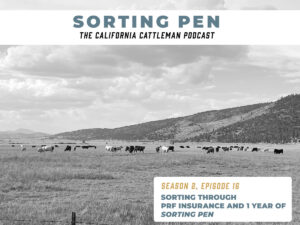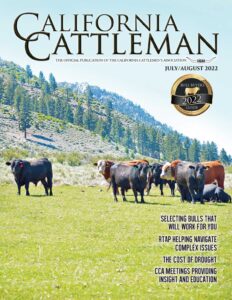
LEGISLATIVE BULLETIN
August 8, 2022
To read the full version each week, please subscribe below.
Inflation Reduction Act Includes Investments for Ag and Rural Communities
Yesterday, the Senate passed H.R. 5376, the Inflation Reduction Act by a vote of 51-50, with Vice President Kamala Harris casting a tie-breaking vote in favor of the legislation.
While much of the media attention around the Inflation Reduction Act has focused on provisions relating to healthcare, climate change and tax revenue, the $750 billion legislation also includes roughly $40 billion in agricultural investments, including $5 billion allocated to the U.S. Forest Service to undertake fuels reduction and carbon sequestration activities on USFS lands.
The legislation also appropriates $20 billion in additional funding for environmental stewardship programs administered by the USDA’s Natural Resources Conservation Service, including $8.45 billion for the Environmental Quality Incentives Program (EQIP) and $3.25 billion for the Conservation Stewardship Program (CSP).
The bill also sets aside $14 billion for rural development, including $500 million earmarked for the development of biofuels infrastructure.
Of additional interest to producers in drought-plagued California, the bill directs a total of roughly $4 billion to the Bureau of Reclamation for drought resilience and water supply projects – which Governor Gavin Newsom’s office has hailed as critical to stabilizing the Colorado River system and accelerating Salton Sea projects.
According to an analysis prepared by the National Cattlemen’s Beef Association, the Inflation Reduction Act does not include harmful tax provisions previously contemplated by President Biden’s “Build Back Better” initiative – such as changes in the stepped-up basis or like-kind exchanges – which had raised concerns within the cattle industry and were previously reported in Legislative Bulletin. Rather, the Act raises revenues through a corporate minimum tax, increased enforcement by the IRS and other provisions.
The Inflation Reduction Act will be taken up in the House of Representatives on Friday, where it is expected to pass on a party-line vote, after which President Biden is expected to sign the Act into law.
SWRCB Issues Updates on Water Rights Curtailments in Scott, Shasta, Russian River and Sacramento-San Joaquin Delta Watersheds
Since last week’s Legislative Bulletin, curtailments for Scott River, Shasta River and Sacramento San-Joaquin Delta Watersheds have been announced.
Scott and Shasta River Watershed
The drought emergency regulation for the Scott and Shasta River watersheds was reapproved with amendments on July 29. The full text is available here.
The State Water Resource Control Board (SWRCB) on Tuesday issued additional curtailments in the Shasta River watershed with a priority date of April 1, 1885 or later. Impacted water rights holders should coordinate with the Scott Valley and Shasta Valley Watermaster and the SWRCB to ensure minimum flow requirements are satisfied before diverting. Impacted water rights holders must certify their compliance with the curtailments via the Water Right Form and Survey Submittal Portal by Friday.
For additional information, visit the Scott River and Shasta River Watersheds Drought Response webpage.
Russian River Watershed
On July 27, the Federal Energy Regulatory Commission approved a variance that substantially reduces flows from the Potter Valley Project to the Russian River watershed. The SWRCB has posted a revised Curtailment Status List reflecting the reduced water availability. Access the Russian River Drought Response webpage to see if your water rights have been curtailed by this or a previous curtailment order.
Sacramento-San Joaquin Delta Watershed
As of Wednesday, several curtailments have been imposed within the Sacramento-San Joaquin Delta watershed.
Appropriative water rights in the Sacramento River watershed outside of the Legal Delta with a priority date of 1917 or later have been curtailed. Additionally, rights on several Sacramento River tributaries have been curtailed, including appropriative water rights for the Upper American River subwatershed with a priority date of 1852 or later, the Yuba River subwatershed with a priority date of 1875 or later and the Bear River watershed with a priority date of 1853 or later.
All appropriative water rights in the San Joaquin River watershed outside of the Legal Delta have been curtailed. Additionally, water rights on several San Joaquin River tributaries have also been curtailed, including all riparian water rights in the Calaveras River and Chowchilla River subwatersheds.
The above curtailments are expected to continue through summer and the beginning of fall, depending on precipitation.
For questions about curtailment and suspension notices or how to comply, please contact the Rancher Technical Assistance Program at (916) 409-6902 or rtap@wrstrat.com.
CDFW Provides Update on State’s Gray Wolf Population
On Tuesday, the California Department of Fish and Wildlife (CDFW) issued its Quarterly Wolf News Update on its Gray Wolf web page for April through June 2022. CDFW’s quarterly update includes new activity from the Lassen and Whaleback packs.
Both the Lassen and Whaleback packs currently have at least a dozen pack members. Since the last quarterly update, the Lassen Pack has produced a litter of five new pups – two males and three females – growing the pack to a total of 12. Only the breeding female, LAS01F, is fitted with a functioning GPS collar. In the Whaleback pack, there are at least six new pups, leading to a pack of 13. CDFW has yet to conduct genetic analysis on the new little of pups. The Whaleback Pack likewise has only one functioning GPS collar, attached to the breeding male.
A wolf designated OR103 dispersed from Scott Valley in May, before crossing Interstate 5 and traveling through Shasta and Butte Valleys. Later, this wolf traveled through the southern Cascades in June and into Oregon on July 2, where it remains. More information can be found about these and other wolves on the CDFW Gray Wolf webpage.
To report evidence of wolf presence including sightings or wolf signs, please fill out the survey on the CDFW Gray Wolf web page here.
ACT NOW: Encourage NRCS to fund cost-sharing for non-lethal predator management
CCA has joined the Western Landowners Alliance (WLA) in asking the USDA’s Natural Resources Conservation Service to assist livestock producers with implementation of non-lethal predator deterrents through the agency’s cost-sharing programs. Specifically, CCA and WLA are requesting that cost-sharing assistance through NRCS’s Environmental Quality Incentive Program and other programs be made available for three practices: range riding, carcass management and fencing. CCA recommends that California producers sign on to the letter to encourage NRCS to defray the costs of non-lethal deterrent mechanisms for producers who voluntarily undertake those deterrents.
A formal letter with signatories will be sent to the agency with the request for funding.
To learn more about the Western Landowners Alliance’s efforts and sign the letter, click here.
Newsom Declares Wildfire Emergency in Siskiyou County Due to McKinney Fire
Governor Newsom late last month proclaimed a state of emergency in Siskiyou County due to the McKinney Fire, which as of this morning has burned 60,379 acres and is only 40% contained. Tragically, the blaze has taken five lives. Newsom has also declared a state of emergency for Mariposa County’s Oak Fire, which has now scorched 19,244 acres and is 94% contained.
The emergency declarations provide Siskiyou and Mariposa counties greater access to state resources to combat the fire and improve impacted residents’ access to emergency assistance.
Additional information about these and other wildfire incidents can be found via Cal Fire and InciWeb.
2022 CCA Scholarship Applications Now Available
Applications for the 2022 CCA Scholarships are being accepted now through October 1, 2022. CCA awarded $63,000 in scholarships to students studying agriculture, although scholarship amounts and quantities vary year to year. Current CCA members (producer, feeder or YCC) that are currently enrolled at a university or college are eligible to apply. Past recipients of her CCA scholarship program may also apply again this year. For a complete list of awards and to download the application visit calcattlemen.org/scholarships. Contact Maureen in the CCA office at maureen@calcattlemen.org with any questions.
Upcoming Industry Events
Working Rangelands Wednesdays Webinars
June 29 – Sept. 7, Virtually
Join UC Cooperative Extension advisors, specialists, researchers and ranchers for a biweekly summer webinar series highlighting applied, land manager-oriented solutions for rangeland drought challenges. Webinars will air biweekly from 6pm to 6:45pm. Click here to register and receive a link to the following scheduled webinars.
August 10: Culling vs. Feeding
August 24: Irrigating with limited water
September 7: Fall/Winter Forecast and Remote Sensing
California Department of Food and Agriculture Listening Session “The Next Farm Bill”
August 10 – September 7, Virtual and in Person
Join in on the California Department of Food and Agriculture listening sessions for the 2023 Farm Bill. For more information regarding the Farm Bill, click here.
August 10: Virtual, click here to register.
August 16: San Diego, click here to register.
August 23: Fresno, Live Only
September 7: Live Only
Public Lands Council Annual Meeting
August 24-26, Cody, Wyoming or virtually
Come join the Public Lands Council for their Annual Meeting in Cody, Wyoming. A virtual option is available for those who can’t attend in person. The meeting will cover an array of topics including current issues, panel discussions and much more. To register for the event, click here. Click here to see the agenda.
Fall River-Big Valley Cattlemen’s Association “Sweet 16” Team Branding
September 4, 2022, McArthur, California
The Fall River-Big Valley Cattlemen’s Association will host their “Sweet 16” Team Branding in September. Entries are due by August 19, 2022. For more information and to enter email fallriverbigvalleycattlemen@gmail.com.
UC Davis Animal Science Bovine Artificial Insemination Clinic
September 12-14, UC Davis Feedlot and Beef Barn
The UC Davis Young Cattlemen’s Association will be hosting an AI Clinic taught by veterinarians from the UC Davis School of Veterinary Medicine. To register for the event, click here. Click here to see the flyer.
Industry News
McKinney Fire claims fifth victim – longtime wildfire lookout who was urged to evacuate San Francisco Chronicle “The McKinney Fire, the roughly 94-square-mile wildfire burning in Klamath National Forest in Northern California, claimed its fifth victim, NPR reported.” To continue reading, click here.
Massive restoration project’ planned for Los Padres National Fores. Here’s what is proposed SLO Tribune “Officials with the U.S. Forest Service are seeking public comment on a massive, proposed project in Los Padres National Forest to reduce fire fuels, restore fire-adapted ecosystems and conduct prescribed burns.” To continue reading, click here.
‘It scares the heck out of me’: California’s federal firefighter shortage has gotten dramatically worse San Francisco Chronicle “As California’s wildfire season ramps up, the number of federal firefighters in the state is down — way down — plummeting to its lowest level in years, despite pledges by fire officials to have boosted the ranks before a potentially busy summer.” To continue reading, click here.
Nothing to Stop It:’ McKinney Fire Destroys Scenic Town of Klamath River KQED “Roger Derry, 80, and his son have lived together in the tiny scenic hamlet of Klamath River in Northern California for more than 40 years. They know most of the town’s 200 or so residents.” To continue reading, click here.
August marks one year of Sorting Pen! Click here to listen to our 27th episode as WSR’s Matt Griffith explains what you need to know about the Pasture, Rangeland & Forage (PRF) Insurance product. Stay tuned through the end of the episode for a look at what’s to come on this podcast in the weeks ahead.



